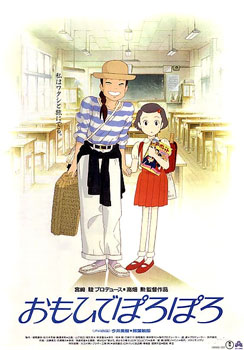
Director: Isao Takahata (1991, Japanese, 118 mins)
Reviews: RottenTomatoes (100%), IMDB (7.7), Wikipedia, Amazon.
Similar movies: anime, joyful, romance.
Summary: A lovely movie: calm and gentle like a steady stream. With comedy, nostalgia and romance packaged together into a wonderful work of art.
The story revolves around a 27-year old girl Taeko. She starts remembering her childhood, when she was nine or ten. There is no 'cat bus', no mythical creatures, no fantasy. It's real and simple. In fact, the beauty of the movie lies in its simplicity. It reminds me of movies like 'An Autumn Afternoon' by Yasujiro Ozu.
Details: Taeko is an unmarried city girl with a busy but boring life. She makes a trip to the countryside. During the trip, she starts remembering seemingly mundane events from her childhood: how she was picky and didn't like certain foods, how she had quarrels with her sisters over bags and clothes, how she was awed by big bathhouses, what happened when girls of her age started getting their periods, how her dad didn't let her participate in drama because it wasn't perceived as a good line of work, how her dad slapped her the only time in her life, how she developed feelings for a boy for the first time, how she had a difficult time understanding division of a fraction by another fraction, how she continued to feel guilty at being unkind and rejectful towards a boy who sat next to her for several months, and so on.
Scenes of the past are interleaved with scenes from the present. During her trip to the countryside, Taeko develops a friendship with Toshio, a joyful farmer who loves nature and organic farming. Slowly, Taeko realizes that her friendship is actually a deep connection because her conversations with Toshio evoke memories from the past, which help her understand herself better. Their connection is sublime. No hugs or kisses.
The movie interleaves the present and the past very well. The transitions are smooth and poetic. The interleaving increases as the movie progresses, culminating in a beautiful end sequence. As Taeko departs from the countryside in a train, she starts wondering whether her happiness lies in a career in the big city or with Toshio in the countryside. "Love knows not its own depth until the hour of separation", as Gibran says. If I close my eyes and imagine, "could I have made the end sequence any better?" Not at all. "Could I have even conceived of it?" No. The end sequence is a gem.
All in all, the movie narrates a story of self realization - what makes us truly happy? And it reminds me of creeks and forests. The most endearing conversations that I remember from my hikes centered around memories from childhood
Good review — Another good review.
Watch online: Part I — Part II — Part III — Other choices.
The closing sequence plays the song Ai wa hana, kimi wa sono tane by Miyako Harumi. The song is a Japanese version of "The Rose" by Amanda McBroom:
THE ROSE by Amanda McBroomSome say love, it is a river that drowns the tender reed.
Some say love, it is a razor that leaves your soul to bleed.
Some say love, it is a hunger, an endless aching need.
I say love, it is a flower, and you its only seed.
It's the heart, afraid of breaking, that never learns to dance.
It's the dream, afraid of waking, that never takes a chance.
It's the one who won't be taken, who cannot seem to give.
And the soul, afraid of dyin', that never learns to live.
When the night has been too lonely, and the road has been too long,
And you think that love is only for the lucky and the strong,
Just remember in the winter far beneath the bitter snows,
Lies the seed, that with the sun's love, in the spring becomes The Rose.
Somehow, I feel that the Western style of singing doesn't do justice to these lyrics. My ears are attuned to warmth and gentleness of Indian classical singers like Lata Mangeshkar, S P Balasubramaniam and Hari Haran. Anyhow, the best version on YouTube that I could discover is by Amanda McBroom herself.

Director: Isao Takahata (1988, Japanese, 89 mins)
Reviews: RottenTomatoes (97%), IMDB (8.4), Wikipedia, Amazon, Roger Ebert.
Watch online: WatchAnimeMovie.
Similar movies: anime, death, depressing, intense, war.
Summary: Yet to write.

Director: Isao Takahata (1999, Japanese, 104 mins)
Reviews: RottenTomatoes (71%), IMDB (7.2), Wikipedia, Amazon.
Similar movies: anime, family, joyful.
Summary: A comedy anime movie by Isao Takahata. Minimalistic hand drawn cartoons. Some beautiful scenes showcasing conflict and love among all members of a family. The movie does not have a story. It is a series of short scenes showing various aspects of the family. The last fifteen minutes seemed long drawn to me. Overall, a watchable movie.

Director: Isao Takahata (1982, Japanese, 60 mins)
Reviews: RottenTomatoes (59%), IMDB (7.0), Wikipedia, Amazon.
Watch online: WatchAnimeMovie.
Similar movies: anime.
Summary: A cute story of a young cellist named Gauche who must practice hard for an upcoming concert. The conductor picks on him repeatedly because his performance is not hundred per cent. On successive nights, Gauche is visited by talking animals: a cat, a cuckoo, a raccoon and a mouse. They bow to Gauche and implore him to teach them various aspects of music. In reality, the animals are teaching him! :) Gauche realizes this much later and feels sorry for having been so haughty and so unkind to most of the animals. The story has a beautiful message and would appeal to young children.
Personally, I connect with this movie as follows: when I am sharing my knowledge with somebody, am I really a teacher? Or am I a student? It's not obvious.
This movie helped me discover Kenji Miyazawa (1896 - 1933), an acclaimed Japanese short story writer. Would love to read his works in English. For example, Once and Forever.
detailed synopsis at Nausicaa.Net.

Director: Isao Takahata (1994, Japanese, 119 mins)
Reviews: RottenTomatoes (83%), IMDB (7.4), Wikipedia, Amazon.
Watch online: WatchAnimeMovie.
Similar movies: anime.
Summary: Storyline: Development of human cities results in deforestation, which leaves many raccoons homeless. They try various tactics to help humans understand their plight, so that they stop building their cities. In Japanese folklore, raccoons have shape shifting abilities. They can transform into objects and other living creatures. However, such transformation techniques require focus and energy. They may be learnt only from reknowned teachers, who have spent lifetimes mastering them.
Most of the movie is fun, but not all. There are some scary and violent scenes when raccoons try grotesque techniques to stop humans. These scenes made the movie incongruous to me. Why? Shape shifting teachers in the movie look like experienced martial artists. Eastern martial arts traditions emphasize peace. They avoid the use of force unless really necessary.
A mellower movie with a more cogent storyline would have been more attractive. The silver lining is that kids who watch this movie will learn that urbanization impacts those who dwell in forests. So we should be mindful of expansion and increased consumption.
Is Pom Poko Suitable For Children? is a nicely written article.

